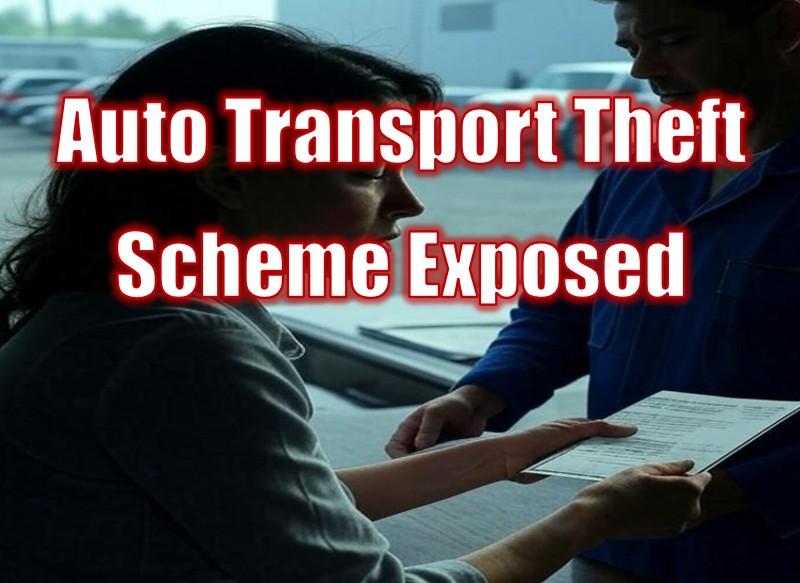How Fraudsters Can Exploit a Transport Portal to Steal High Value Repossessions
Alarm bells are going off all over the repossession industry regarding agency liabilities resulting from a rash of auto thefts being conducted through auto transporters. While the focus seems to be on high value autos, this scheme can be used on vehicles of any value. With lenders trying to lay the blame of the releasing parties; namely, the repossession agencies, there appears to be some plausible explanation how this scheme works.
On July 6th, Carmen Giannone of Giannone Companies Towing Enforcement, reported this issue in an article discussing the communications sent out from Cox on this very issue. Then on July 29th, the ARA posted an alert advising agency owners of the risks of fraudsters stealing cars through transport brokers.
Following this, I received an email from James Waldren of 1st Adjusters in Texas telling me that he actually gave a presentation on the topic at Used Car Weekly last year. So, apparently, this is really nothing new.
But now this is issue and the scheme being perpetrated is being explained with greater detail by a video from a YouTuber with the handle “Hotshot Haulers”. In his video, he breaks down how this sophisticated scheme can be used to steal high-value vehicles, like a $700,000 Lamborghini, through Central Dispatch, the largest U.S. marketplace for vehicle transportation.
Central Dispatch is owned by Mannheim Auto Auction and Cox Automotive and connects dealers, carriers, and brokers. But according to HotShot Haulers, Central Dispatch is directly responsible and this is how the scam works and how it can be prevented.
See the video below
–
The Scam Explained
HotShot Haulers reports that the scheme involves four key players: an unsuspecting dealer, an unsuspecting carrier, a fraudulent broker, and a fraudulent carrier—often the same person operating under separate accounts. The process begins when a dealer, say in Maryland, needs to ship a high-value car, like a 2024 Lamborghini, from California. They post the job on Central Dispatch’s load board, detailing the car’s make, model, year, and transport route.
A fraudster, posing as a legitimate carrier, contacts the dealer, offering to transport the car. On the surface, everything appears legitimate: the carrier has positive reviews, a work history, and sometimes a generic AI-generated website. The dealer, trusting these credentials, dispatches the car without thoroughly verifying insurance or other details.
The fraudster, now with the car’s details, logs into a separate fraudulent broker account and reposts the job, altering key information to obscure the scam. For example, instead of a 2024 Lamborghini going from California to Maryland, they list a 2022 model for delivery within California, often to Los Angeles, a hotspot for these thefts.
An unsuspecting legitimate carrier accepts this reposted job, believing it’s a standard short-haul task, perhaps just across town. They pick up the car from the dealership and deliver it to a designated drop-off point, often near a dealership or a nondescript location like behind a Costco.
Here, the fraudster, posing as the recipient, meets the carrier with a suspicious story, such as claiming the dealership lot is too full. The carrier hands over the car for a small fee, typically $400-$500, unaware they’ve just facilitated a theft. The fraudster disappears with the vehicle.
How the Scam Succeeds
The scheme exploits trust and oversight gaps. Dealerships or repossession agencies, often rushed, fail to verify the bill of lading, which should list the car’s true owner and destination. An employee may release the vehicle without checking, missing red flags like a local drop-off for a car sold to an out-of-state buyer.
According to HotShot Haulers, Central Dispatch’s alleged lax oversight compounds the issue. The platform’s customer service, described as unresponsive, often dismisses complaints about fraudulent carriers with generic responses like, “We’ll look into it,” without taking action.
Preventing the Theft
Carriers and dealerships can prevent these thefts with simple diligence:
- Verify Ownership: Carriers should request the dealership’s records of the car’s buyer, including their name, address, and phone number, and confirm directly with them.
- Check the Bill of Lading: Dealerships must ensure the bill of lading matches the buyer’s details and intended destination. A $700,000 car going across town instead of cross-country should raise alarms.
- Scrutinize Drop-Offs: Carriers should be wary of unusual drop-off locations or recipients who don’t match the profile of a high-value car owner, such as someone appearing disheveled or meeting on a side street.
- Know Your Contacts: Carriers with established relationships are less likely to fall for scams, as they can cross-check details with trusted parties.
Central Dispatch’s Alleged Role
“Hotshot Haulers” directly criticizes Central Dispatch for its failure to address this fraud. Despite being owned by industry giant Cox Automotive, reports of fraudulent carriers using inadequate equipment or misrepresenting themselves are met with inaction, allegedly leaving the platform ripe for exploitation.
Conclusion
The “Hotshot Haulers” video exposes an alleged troubling vulnerability in Central Dispatch, where fraudsters exploit trust and poor oversight to steal high-value cars. By manipulating accounts and leveraging unsuspecting carriers, scammers can make off with vehicles worth hundreds of thousands. However, basic verification steps by repossession agencies and carriers can break this chain. Until Transport Brokers strengthens their fraud prevention, vigilance remains the industries best defense against these costly thefts.
EDITOR’S NOTE
The information presented in this article, sourced from a YouTube video by Hotshot Haulers, is provided for informational purposes only and reflects the opinions and experiences of the video’s creator. CURepossession.com and CUCollector.com do not endorse, verify, or assume responsibility for the accuracy of the claims made regarding Central Dispatch, Cox Automotive, or any related entities. We are not affiliated with Central Dispatch or Cox Automotive and have no direct knowledge of their operations or practices. Readers are encouraged to conduct their own research and exercise due diligence when engaging with any vehicle transportation platform. CURepossession.com and CUCollector.com disclaim any liability for actions taken based on the information in this article.











More Stories
Rising Fuel Costs Are Impacting Repossession Operations
A Repo, Gun Threats, Hidden Meth, and a Felon’s Desperate Hideout
ATR Driver Critically Injured in Semi Collision – Needs Help!
Colorado Bill Aims to Severely Impact All Repossession Operations
Tragedy Strikes Benchmark Recovery Family – Help Needed!
Gun to the Head: Conviction in the Slidell Repossession Nightmare